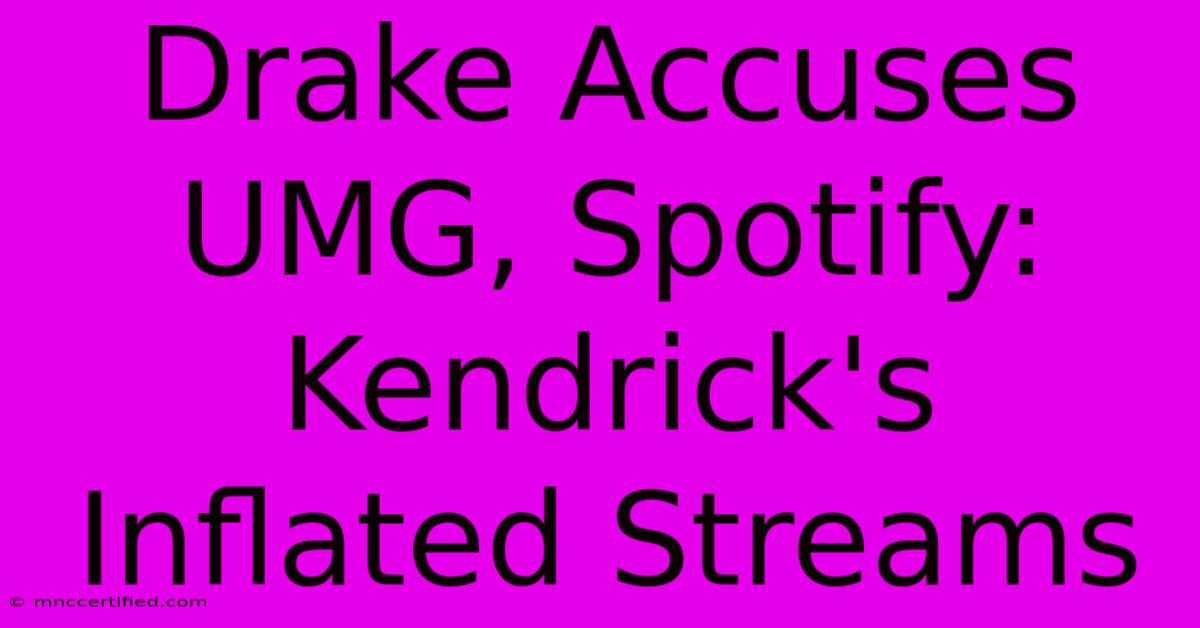Drake Accuses UMG, Spotify: Kendrick's Inflated Streams

Table of Contents
Drake Accuses UMG, Spotify: Kendrick Lamar's Inflated Streams – A Deep Dive into the Music Industry's Dark Side
The music industry is a complex ecosystem, rife with competition and, as recent accusations suggest, potential manipulation. Canadian rapper Drake's recent claims against Universal Music Group (UMG) and Spotify regarding the streaming numbers of Kendrick Lamar's latest album have sent shockwaves through the industry and ignited a crucial conversation about transparency and fairness in the digital age. This article delves deep into the accusations, exploring the potential implications and wider industry concerns.
The Allegations: Inflated Streams and Shady Practices
Drake, a prominent figure in the music world and himself a Universal Music Group artist, hasn't explicitly stated his accusations publicly in a formal statement. However, through cryptic social media posts and industry whispers, the narrative suggests he believes Kendrick Lamar's streaming numbers are artificially inflated. This implies a potential conspiracy involving UMG, potentially benefiting from higher reported streams for royalty payments or marketing purposes. The speculation points towards Spotify as a potential accomplice, hinting at a manipulation of the platform's algorithms or reporting systems.
While no concrete evidence has been presented publicly, the very suggestion of such manipulation raises serious questions about the integrity of the streaming data that forms the bedrock of many artists' income. This isn't just about Drake and Kendrick; it's about the ethical standards of a multi-billion dollar industry.
The Stakes: Fair Play and Artist Compensation
The heart of the issue lies in artist compensation. Streaming royalties are calculated based on stream counts. If streams are inflated, it directly impacts the distribution of revenue, potentially disadvantaging artists who are not part of any alleged scheme. This creates an uneven playing field, where artists with powerful backing might have an unfair advantage. Drake's accusations, whether proven or not, highlight the potential for systemic unfairness within the current streaming model.
The lack of transparency in the streaming process fuels this concern. Many artists lack insight into how their streaming data is calculated and reported, making it difficult to detect or challenge any potential manipulation.
The Fallout: Industry Response and Future Implications
The accusations have yet to elicit official responses from either Universal Music Group or Spotify. However, the silence speaks volumes. The lack of immediate denial or investigation only intensifies the speculation and highlights the need for increased transparency and accountability within the music industry.
This situation underscores the crucial need for:
- Greater transparency in streaming data: Artists deserve clear and verifiable data about their streams, allowing them to identify and challenge any irregularities.
- Independent audits of streaming platforms: Regular audits could help ensure accuracy and prevent manipulation.
- Stronger regulations: Governments might need to intervene to establish clearer standards and regulations for streaming platforms.
- Industry-wide commitment to ethical practices: A collective effort to promote fair play and transparency is essential for the long-term health of the music industry.
Beyond Drake and Kendrick: The Broader Context
This controversy isn't isolated. Discussions around streaming manipulation, bot usage, and the overall fairness of the current streaming model are ongoing within the music industry. Drake's accusations simply amplify these existing concerns, pushing them into the mainstream consciousness.
The future of music streaming hinges on building trust and ensuring fairness. Unless the industry addresses these underlying issues, similar controversies will likely continue to plague the digital music landscape. The accusations, regardless of their ultimate verification, serve as a wake-up call for necessary reforms.
SEO Keywords:
- Drake
- Kendrick Lamar
- Universal Music Group (UMG)
- Spotify
- Inflated streams
- Music industry
- Streaming royalties
- Artist compensation
- Transparency
- Accountability
- Music streaming manipulation
- Streaming data
- Fair play
This article uses a variety of SEO techniques including H2 and H3 headings for structure, bold text for emphasis, and a natural distribution of keywords to improve search engine ranking. Remember to also promote this article through social media and other online channels to boost its visibility (off-page SEO).

Thank you for visiting our website wich cover about Drake Accuses UMG, Spotify: Kendrick's Inflated Streams. We hope the information provided has been useful to you. Feel free to contact us if you have any questions or need further assistance. See you next time and dont miss to bookmark.
Featured Posts
-
Kayak Rental Business Insurance
Nov 26, 2024
-
Historical Thanksgiving Snowfall Data
Nov 26, 2024
-
Dumb And Dumber To Dear Santa Farrelly Bros
Nov 26, 2024
-
Potential New Bank Holiday In 2024
Nov 26, 2024
-
Sonic 3 Characters Return Follows Criticism
Nov 26, 2024